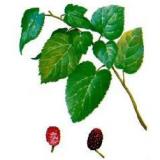Specification: 12:1
Test Method TLC
Mulberry Leaves Extract Morus alba 1-Deoxynojirimcin
Mulberry leaves have long been used in Chinese medicine for the prevention and treatment of diabetes; they contain compounds that suppress high blood sugar levels.
Mulberry Fights Arterial Plaque
Scientists in Japan have pinpointed a number of biologically active compounds in extracts of the leaves of the white mulberry, Morus alba, a plant that silkworms are crazy about. 1 Not that the silkworms care, but the mulberry-leaf extract turns out to be effective in suppressing the progression of atherosclerosis, the buildup of cholesterol-rich plaque in our arteries. 2 It does this, apparently, by inhibiting the oxidation of LDL-cholesterol (low-density lipoprotein, the ¡°bad cholesterol¡±), which is a major factor in the development of atherosclerotic plaque.
The Japanese researchers reached this conclusion based on their observations of the antioxidant effects of the mulberry extract on LDL-cholesterol taken from both rabbits and humans. They believe that the agents primarily (but not exclusively) responsible for this effect are two closely related compounds, isoquercitrin and astragalin. The former contains, as part of its molecular structure, the well-known antioxidant flavonoid quercetin, which is found in many foods and in a variety of nutritional supplements.
In studying the antioxidant effects of the whole mulberry-leaf extract and, separately, of the compound isoquercitrin, as well as of the compound quercetin (which is not found as such in mulberry), the researchers observed that all were effective but that isoquercitrin was somewhat less effective than the same amount of quercetin. They also reported, however, that when isoquercitrin is ingested (by mice), it is largely metabolized to quercetin. Thus, although quercetin is not found in mulberry, mulberry is still a good source for it (and the silkworms still couldn¡¯t care less).






 E-mail:
E-mail: